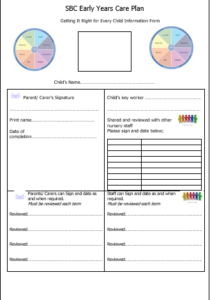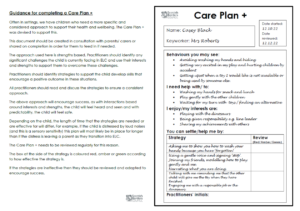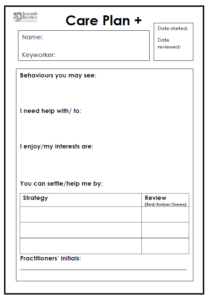Personal Plans
Care Plans
What are they?
A Care Plan is a working document developed by practitioners and completed with the families to record the child`s personal routines, interests and preferences, informing how the setting meets the child`s needs appropriately.
Information in the Care Plan should be reflected in the child’s learning journey, e.g. an interest in trains, playing with water or dinosaurs to show that children’s interests are being used to support their learning.
Care Plans should include:
- Child’s name, date of birth and photograph
- Space for the key worker/childminder and parents to sign and date to indicate the information has been reviewed (at least every 6 months)
- Information about the child’s routines, e.g. sleeping and toileting routines
- Information about the child’s family, significant people and friends in their life
- Information about interests, favourite toys, and activities (this may be put into the child’s learning journey)
- Information about feeding and eating habits – favourite foods, foods which are disliked, allergies or intolerances
- Information about medical needs and medical conditions.
- Information about the involvement of partner agencies, e.g. medication, SaLT
- Information about the family’s home culture and religion
- Information about ways the family supports their child’s behaviour
Key messages:
Anyone should be able to read the information and know how to support that child’s individual needs.
- Children and families are central to gathering information to support children’s wellbeing through the health and wellbeing indicators embedded within their personal planning approach.
- Personal care and learning needs reflect family preferences, for example, religious considerations, dietary requirements, family makeup or medical needs.
- Sleep routines are reflective of individual children’s needs and family wishes.
- Children’s interests and life experiences are used to create child-centred plans.
- Practitioners have established strong, trusting partnerships with parents to share information about the child.
- All practitioners recognise the importance of effective communications and implement this when children are experiencing any transition.
- Practitioners use key information to effectively plan for both continuity and change in children’s care, play, and learning needs.
- Key information to support children’s continuity and progression in their care and learning are shared appropriately, securely and in good time.
- Care Plans often include an ‘All About Me’ section which details children’s interests, family, favourite toys, pets. This section can also form part of the child’s learning journey so that it can be referenced easily to enable practitioners to use this knowledge when making provisions for the child.
- Care Plans should use the health and wellbeing indicators to support the assessment of children’s needs and progress to ensure that the setting is Getting it Right for Every Child.
(A Quality Framework for Daycare of children, childminding and school-aged children, Care Inspectorate, 2021)
Ways we can do this:
Spend time talking about the purpose of and completing the Care Plan with the parents (and child) before the child starts a setting or as soon after as possible.
Ensure that parents understand that there is an expectation that information will change as the child moves through the setting, and this is why the information needs to be reviewed.
Send Care Plans home or invite parents into the setting to review the contents every 6 months.
Parents complete new Care Plans annually to ensure the information has been thoroughly reviewed and reflects the child’s current needs, interests, and the child and family’s wishes.
Ensure all practitioners, especially the child’s keyworker, as appropriate, familiarise themselves with the contents of the Care Plan to support the child’s learning, interests and the child and family’s choices within their daily practice.
Ensure any changes to the information are updated immediately. Changes should be highlighted and dated to ensure they are visible and easily noticed. Add dates of reviews and auditing to Quality Assurance Calendar.
Share any important information such as food allergies with the relevant people, e.g. kitchen staff.
Care Plans must include information about medical needs, e.g. medication, medical contacts such as the GP, paediatrician or consultant.
Information about the involvement of partner agencies, e.g. SaLT, social worker etc.
Linked Areas of Practice
Attachment
Child First
Children’s Rights
Child’s Voice
Chronologies
Family Partnerships
Inclusion
Learning Journeys
Medication
Personal Plans
Policies & Procedures
Tools
Reflecting on Practice
SBC Guidance to support
National Guidance to support
Further Reading to support
Training to support
Follow link for acronyms used in presentations



